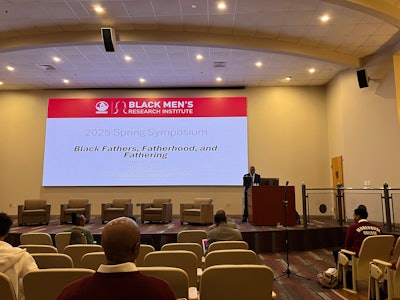 Allison Joyner
Allison Joyner
The symposium, held in the Bank of America auditorium on Morehouse's historic campus, centered on the theme "Black Fathers, Fatherhood, and Fathering" – a multidimensional exploration of how Black men function as fathers to both biological and non-biological children in their communities.
"These spaces created for discussions about Black fatherhood are under attack," Perry warned during his address. As professor of Social Work and BSW program director at the University of Louisville, Perry's research represents a critical counternarrative to stereotypical portrayals of Black fathers in American society.
Dr. Derrick Brooms, professor of Africana Studies and executive director of the BMRI, opened the second day by reflecting on the symposium's first day of discussions before introducing Perry.
"What we're witnessing today represents years of dedicated scholarship examining Black male experiences through an asset-based rather than deficit-based lens," Brooms said.
The symposium exemplifies Morehouse's ongoing commitment to creating scholarship by and about Black men. Dr. Clarissa Myrick-Harris, professor of Africana Studies and one of the architects behind the BMRI, provided historical context during her welcome address.
"The institute emerged from cross-disciplinary conversations among faculty who recognized gaps in the academic literature concerning Black men," said Myrick-Harris. "We were adamant that we would not use the deficit model. That was a top priority from the beginning."
This commitment led to the development of a minor studies program focused on Black masculinity, gender, and sexuality – academic foundations that eventually evolved into the BMRI.
Perry's presentation brought together scholarly research with cultural references, including Jay-Z lyrics, to illustrate the complex realities of Black fatherhood. He detailed several clinical programs he has developed and implemented in Kentucky that serve as models for fatherhood initiatives nationally.
His "4 Your Child" program has served over 1,500 fathers in Kentucky, providing parenting education and support. However, Perry acknowledged the program's limitations, which led to the development of his "Fatherhood and Co-Parenting" study.
"We did a good job of helping our dads increase their parenting knowledge and conflict resolution skills, but we weren't able to impact their level of involvement because we couldn't serve mothers," Perry said. "We secured additional funding to develop a complementary program for mothers – a condensed two-hour version of the 28-hour curriculum we use with fathers."
The evolution of Perry's work continued with the "Co-Parenting All Stars" program, which identifies and learns from parents who have established positive, respectful co-parenting relationships despite relationship dissolution.
"One significant challenge we encountered was that many participants – fathers averaging 34 years old, mothers around 32, with children about seven or eight years old – came to us with nearly a decade of co-parenting conflicts," Perry noted. "We had to work diligently to help them overcome this emotional baggage before meaningful progress could occur."
Following Perry's presentation, Dr. Worth Hayes, associate professor of History and Africana Studies and the Avalon Humanities and Social Sciences Endowment Chair at Morehouse, moderated a panel discussion with Perry and two Morehouse students: Evan Span, a Psychology major from Maryland, and Tre'von Henderson, a Sociology and Education double major from Cleveland.
The students shared personal experiences of being nurtured by both biological fathers and "social fathers" – male figures including grandfathers, uncles, coaches, and professors who provided mentorship and guidance.
Perry observed that many social fathers view these relationships as opportunities for redemption or second chances at fatherhood.
“When these opportunities present themselves, many men recognize their value and lean into them fully,” he said.
The panel discussion highlighted the importance of intergenerational dialogue about fatherhood and masculinity, particularly within the context of an HBCU like Morehouse that has historically shaped Black male leadership.
Brooms concluded the symposium by acknowledging Morehouse's institutional support for the BMRI.
“The BMRI represents another iteration of work that has been happening at Morehouse in various forms for two to three decades,” he said. "The institute is now woven into the institutional fabric of Morehouse, joining several centers and institutes established over the past decade that advance scholarship on Black experiences."















